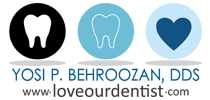Each day patients ask me to avoid taking dental x-rays and help minimize their exposure to radiation. Rightfully so. No one wants to get their head zapped unless it’s absolutely necessary. The purpose of this blog is not to discuss the consequences of radiation and x-rays. There is plenty of information out there. I am not going to discuss the harm or side effects either. We will agree that dental x-rays are definitely something we all would prefer avoiding. Rather, let’s take this discussion into a new direction: What steps can be taken to minimize my dental x-ray radiation exposure?
Technology has come a long way. When I graduated from UCLA in 2002, we strictly used film. We would place a film in the mouth one by one and then go develop it using solutions. Then again, I also used to use a disposable camera and would print the photos at a local store. Nowadays, we have what are called digital dental x-rays. These are simply electronic sensors that connect to a nearby computer. The image instantly pops up on the screen. More importantly, one of the many advantages lies in the fact digital x-rays reduce your radiation exposure by about 75%. This means that when your dentist is using digital x-rays you are much safer. Make sure to ask for them. When we were kids, the technology just wasn’t available
Another helpful technique is using a lead apron with a thyroid collar. Every time a dentist takes an x-ray they cover you with a heavy blanket called a lead apron. The purpose is to block the x-ray beam from radiating the rest of your body. Please make sure your dentist uses one that covers your neck as well. There are vital organs there such as your thyroid gland and there is no need to have that area exposed. It is not enough for the apron to simply cover your upper body. The collar at the top of the apron is a simple must that will really protect you.
A final technique that I really love is spreading out the radiation over a few appointments. Simply put, taking a few today and a few tomorrow is always better than taking them all today. If you generally don’t get many cavities to begin with, ask your dentist to spread out your necessary x-rays over a few appointments. This is especially useful when it’s time for your six month check-ups. Oftentimes, patient’s say “Doc can we skip it this time?” In reality, if you need four x-rays, you’re better off taking two today and two more in six months. It’s okay to have such discussions with your dentist. After all it’s your body and we are here to help.
Hope this helps and feel free to contact me with any questions.


